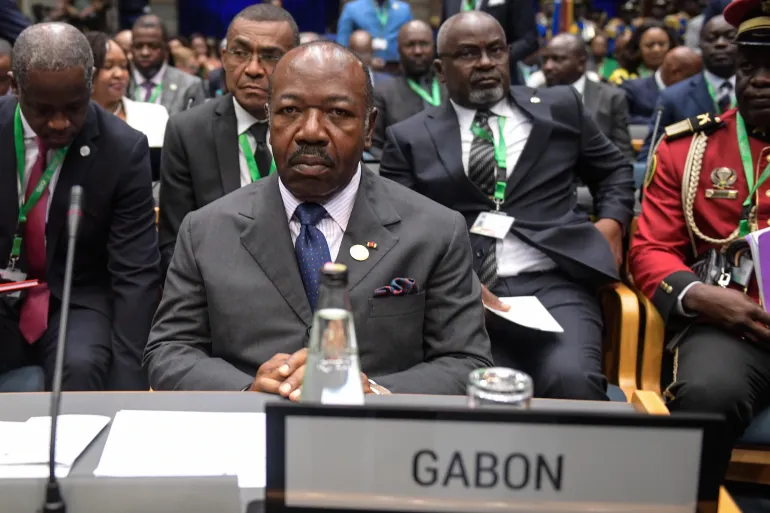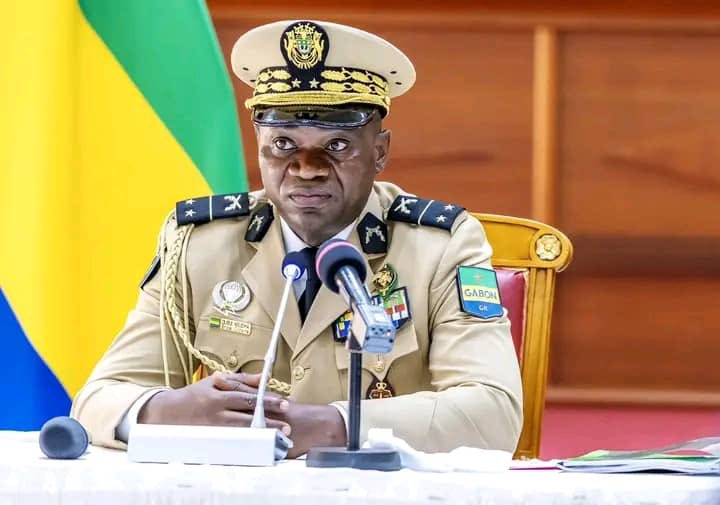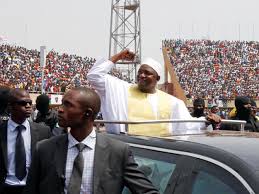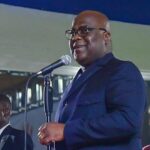President Brice Oligui Nguema of Gabon has expressed interest in changing the country’s constitution to address concerns about political stability and governance. After seizing power in a military coup in August 2023, which ousted President Ali Bongo Ondimba following disputed election results, Nguema and his administration cited the need for reforms that would prevent further political crises and ensure a other system of power that guarantees his authority.

The Bongo family had ruled Gabon for over 50 years, and Nguema’s military intervention highlighted issues with the long-term concentration of power. By proposing constitutional changes, Nguema aims to restructure the political framework, limit presidential terms, and prevent the type of political dominance that his predecessors held. The overall goal appears to be to modernize Gabon’s political system, ensuring better checks and balances, and possibly to legitimize his own position through a transition to civilian rule.
Brice Oligui Nguema’s political opponents include figures from both the former ruling party, the Gabonese Democratic Party (PDG), and opposition groups that have historically opposed the Bongo family’s long rule. After the coup in August 2023, opposition figures expressed mixed reactions—some welcomed the ousting of Ali Bongo, while others were wary of Nguema’s long-term intentions.
Some key political opponents and groups who may oppose Nguema are:
1.Jean Ping: A prominent opposition figure and former African Union chairman, Ping was a strong challenger to Ali Bongo in the 2016 presidential election. He claimed victory in that election, accusing Bongo of rigging the results, and many of his supporters see Nguema’s rise as a continuation of military control over Gabon, which could further delay true democratic change.
2. Alexandre Barro Chambrier: Leader of the “Rassemblement pour la Patrie et la Modernité” (RPM), Chambrier is a vocal opposition figure and critic of both Bongo and military interference in politics. He may push for a faster transition to civilian rule and free elections.
3. Guy Nzouba-Ndama: A former ally of the Bongo family, Nzouba-Ndama broke away from the ruling party and became a critic of Ali Bongo. He has also been a presidential candidate and is likely skeptical of any prolonged military rule.
4. The National Union (Union Nationale, UN): This political party, which has been one of the most significant opposition groups in Gabon, could also be critical of Nguema’s leadership. Its members have consistently fought for democratic reforms and would likely oppose any delays in returning to civilian rule.
5. Civil society and pro-democracy activists: Beyond political parties, various civil society groups and activists in Gabon advocate for deeper reforms, the protection of human rights, and democratic governance. They could become key opponents if they view Nguema’s constitutional changes as insufficient or a means to consolidate power.
While many opposition leaders might have welcomed the end of Bongo’s rule, their primary focus remains on pushing for transparent democratic elections and ensuring that Gabon’s transition doesn’t result in long-term military dominance.
However, critics argue that these changes could be a way for Nguema to consolidate power and extend his leadership under the guise of reform. The exact nature of the constitutional reforms and their long-term impact remain to be seen.
The proposed Constitution in Gabon will allow military leader General Brice Clotaire Oligui Nguema to run for president. This move has drawn criticism from the opposition.
Gabon is set to hold a referendum on November 16 to vote on a new Constitution, sparking mixed reactions.
The new charter would also abolish the position of prime minister and replace it with a vice president role, limiting the term of office for presidents to two seven-year terms. Thus, Nguema has not respected his promise to restore civilian rule by making it clear in the proposed Constitution that the military should not play a role in politics.
It also gives too much power to the president. State media in Gabon is telling citizens that everyone 18 years and older has a civic duty to vote in the referendum.
The country’s transitional military rulers said the new constitution would be a major step toward restoring civilian rule in Gabon and implementing recommendations of April’s national.
The new charter would also outlaw intimate relations between people of the same sex. The proposed text is notably believed to define marriage as a union between a man and a woman and would also make military service compulsory, while confirming French as the country’s official language.
The proposed constitution would not bar qualified civilians and Gabon’s defense staff members, including transitional president Nguema, from running for president because it would be undemocratic to restrain people who are capable from contributing to the welfare of Gabon.
If the constitution is approved, Gabon will not find itself in a situation in which a leader rules until he dies, as was the case with Ali Bongo’s father, Omar Bongo, who was in power for 42 years.
When Nguema seized power last year, he promised to restore civilian rule within two years. He has not said whether he will run for president at the end of the transitional period.
The proposed constitution makes it clear that Nguema wants to stay in power.
Officials are proposing a presidential system in which Nguema would have excessive powers.
A presidential system should have separation and sharing of powers among the legislative, executive and judicial arms of government, however, the proposed constitution would mean that in Gabon, the president would appoint members of the judiciary and could dissolve parliament.
The August 2023 coup put an end to 55 years of rule by the family of former president Ali Bongo Ondimba.
The desire to change Gabon’s constitution under Nguema is more related to addressing broader political and structural issues than directly to ethnic tensions. Key reasons include:
- Breaking the Long-Term Hold on Power: The Bongo family held power for over 50 years, with accusations of corruption, cronyism, and mismanagement. Constitutional changes could focus on limiting presidential terms, which could prevent a future concentration of power in the hands of one family or political group, ensuring fairer political competition.
- Reforming the Electoral System: The controversial 2023 election, which resulted in the military coup, highlighted flaws in Gabon’s electoral process. Constitutional reforms may aim to create a more transparent, inclusive, and fair system that reflects the will of the people, ensuring all regions and ethnic groups feel represented.
- Stabilizing the Political System: By creating checks and balances, limiting presidential powers, and reforming institutions, Nguema may be attempting to reduce political instability. A new constitution could help build a system that avoids the dominance of any one ethnic group or political elite, aiming to strengthen national unity.
- Consolidating Military Power: There is also the possibility that Nguema could use constitutional reforms to legitimize and consolidate his own power, though he has stated that he intends to return Gabon to civilian rule.Any reforms that entrench the military’s influence could fuel distrust between different ethnic groups, especially if they feel underrepresented in the new political order.
While ethnic tensions are not the primary driver behind constitutional changes, ensuring inclusivity and preventing marginalization of different groups—ethnic, regional, or political—will be crucial in maintaining peace and stability in Gabon moving forward.
Gabon has historically not experienced the same level of ethnic conflict as some other African countries, but ethnic and regional dynamics do play a role in its politics and governance. The potential changes to the constitution under Brice Oligui Nguema’s leadership, however, are not explicitly driven by ethnic conflict but more by issues of political power, governance, and the need for reform after decades of the Bongo family’s rule.
Gabon is home to over 40 ethnic groups, with the largest being the Fang, followed by other groups such as the Mpongwe, Myene, Obamba, and Punu. The Fang, primarily in the north, make up around 30% of the population, and historically, they have had a strong influence on Gabon’s politics. Ali Bongo’s late father, Omar Bongo, belonged to the Tekeethnic group from the southeastern part of Gabon, and the Bongo family’s dominance over five decades has created some regional tensions, particularly with Fang leaders who felt marginalized under their rule. However, while ethnic identity plays a role in local politics and regional allegiances, Gabon has avoided major violent ethnic conflicts. Instead, political grievances have largely been about economic inequality, corruption, and political exclusion, rather than being framed solely in ethnic terms.On 30 August 2023, an hour after the official announcement of Bongo’s election to a third term since 2009, a military junta proclaimed his rule was over, denouncing what they said was a rigged poll. The military dissolved the country’s institutions and appointed 98 deputies and 70 senators to a transitional parliament.






Pingback: The Push for Power: Analyzing President Félix Tshisekedi’s Move to Change the DRC’s Constitution - Robert Lansing Institute